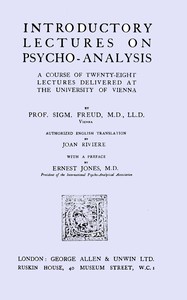Introductory lectures on psycho-analysis : $b a course of twenty-eight lectures delivered at the University of Vienna
Author: Sigmund Freud
Bookshelves: Psychiatry/Psychology

Summary
"Introductory Lectures on Psycho-Analysis: a course of twenty-eight lectures…" by Sigmund Freud is a scientific publication written in the early 20th century. The book serves as a foundational introduction to the theory and practice of psycho-analysis, offering both beginners and more advanced readers an organized pathway into Freud's psychological concepts. Its main focus is to provide a systematic examination of the key elements of psycho-analysis, specifically addressing the psychopathology of everyday life, dreams, and neuroses. The opening of "Introductory Lectures on Psycho-Analysis" begins with a preface outlining the lack of accessible introductory material on psycho-analysis and lauding Freud’s effort to fill this gap. The initial lectures are presented as both a warning and an invitation: Freud cautions his audience about the challenges, controversies, and social resistance they may face in engaging with psycho-analysis. He highlights the difficulties of learning psycho-analysis, given its subjective and private nature, and emphasizes that the field often confronts widespread intellectual and moral prejudices—especially regarding the unconscious mind and the role of sexuality in mental life. Freud then introduces his method by analyzing common errors like slips of the tongue, forgetting names, and misplacing objects, arguing that these seemingly trivial everyday mistakes often have meaning and arise from underlying psychological mechanisms. Through numerous examples, Freud systematically demonstrates that such errors are not random, but instead reflect hidden intentions and mental processes, setting the groundwork for psycho-analytic investigation. (This is an automatically generated summary.)
 LibraryManager
LibraryManager